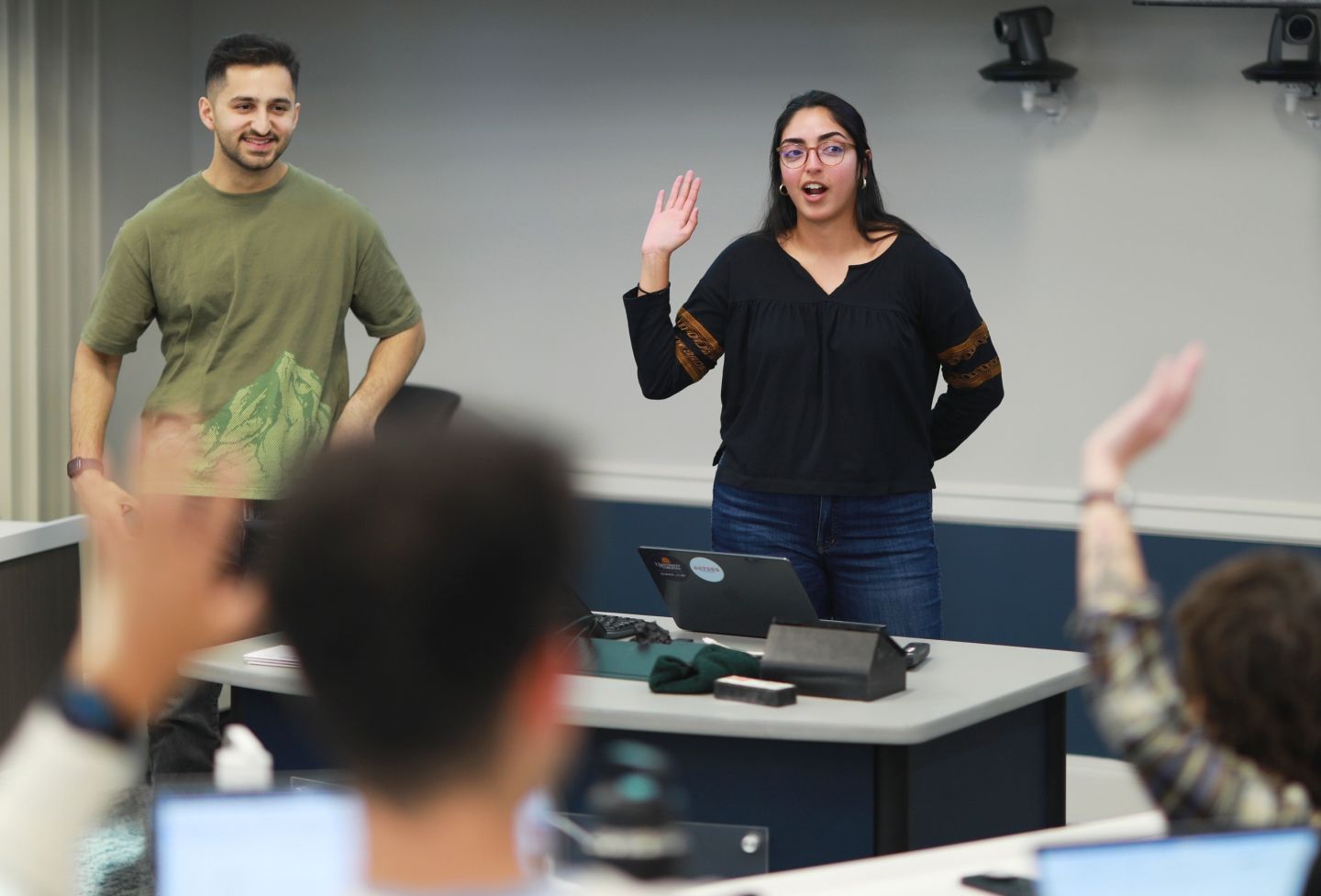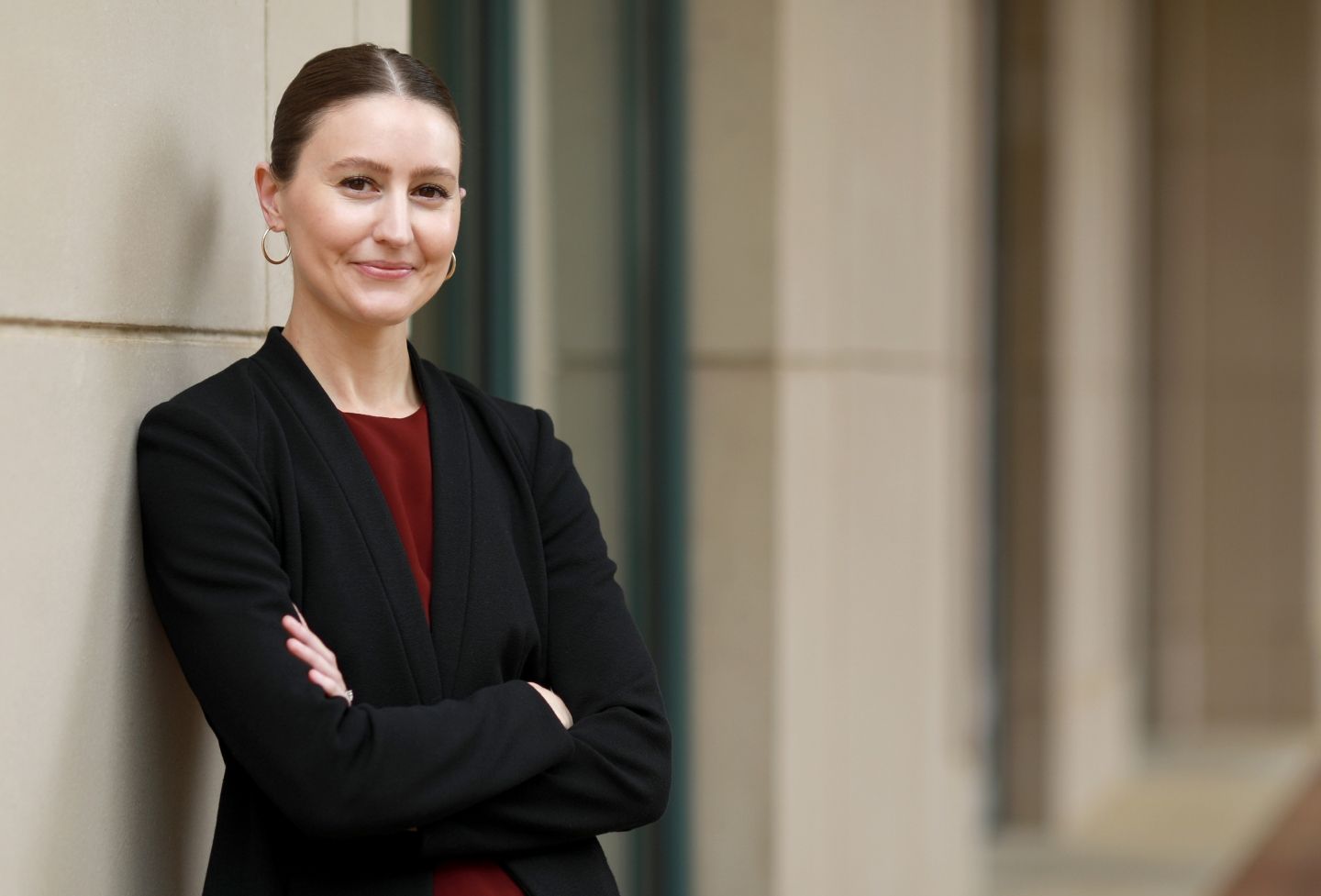Humane Society Lawyers Fight Culture of Cruelty, Government Bureaucracy
It might be hard enough to fight organized criminal gangs engaged in dog or cock fighting but, as lawyers for the Humane Society of the United States told law students Nov. 5, they sometimes have to fight government bureaucracies as well. Ethan Eddy, a staff attorney for the Society, and Sarah Conant '06, a Society litigation fellow, are both up to the task. They spoke passionately about their work on behalf of clients without voices or the ability to pay.

Eddy talked about the side of the Humane Society with which most are familiar: animal rescues, setting up shelters, and caring for animals that are victims of human neglect or worse. He also spoke about the Humane Society's courtroom advocacy challenging laws they see as inadequate at protecting animals or outdated. To do this, Eddy said, "We have 12 full-time litigators and a network of over 200 pro bono lawyers in some of the top firms around the country working on everything from puppy mills to wildlife cases."
The legal activities at the Humane Society are very broad. "We actually end up litigating our way through a pretty big chunk of the Bill of Rights," Eddy said. He described law at the Society as a multidisciplinary field involving criminal, administrative, environmental, constitutional, disability, tort, trusts, and international trade law.
Eddy said the Humane Society is not just looking out for the welfare of household pets. They're also working on behalf of animals in the wild, farm animals, captive animals in zoos or circuses, and animals in research. He also made the distinction between laws that protect animals and laws that protect people from animals. The latter include dangerous dog laws, dog licensing laws, and rabies laws.
While the public has only recently become aware of the legal issues surrounding dog fighting, the Humane Society has been fighting the practice for years. Eddy cited instances in which Humane Society lawyers have filed suit against a national online retail establishment that allegedly engaged in the sale of illegal dog-fighting videos. According to Eddy, Humane Society lawyers have even taken the U.S. Postal Service to court for allowing distribution of publications he said promoted illegal dog and cock fighting.
Regarding animal protection in the realm of research, Eddy charged that there's little government oversight. "There is a federal statute [on research animal protection] which delegates the authority to the Department of Agriculture to oversee it but the Department of Agriculture in turn delegates the day-to-day regulatory and supervision of research protocols to the research institutions themselves."
Sarah Conant spoke about her work with the Humane Society, where she focuses on farm animals. "More than 95 percent of the animals we interact with on a daily basis are farm animals," she said. While law cases relating farm animals to cruelty protection go back to the beginning of our country, Conant explained that most animal protection legislation in place today has come about only in the last 20 years.
One of the biggest areas in which the Humane Society is involved is updating state anti-cruelty laws, many of which, when originally written, exempted farm animals from protection. One such regulation, for example, allows veal calves to be kept in crates too small for the animals to even turn around.
"Eighty-five percent of the 750,000 veal calves raised each year are kept in these crates," Conant said. She cited a list of similar common farm production practices deemed by the Humane Society to be abusive that are allowed under current laws and regulations.
Humane Society lawyers are working with legislatures and in the courts to change laws that affect the lives of millions of farm production animals, Conant explained. She said they are forced to go state by state in this effort because there are very few federal laws regarding farm animal protection and most of those concern the transport and slaughter of farm animals.
Eddy and Conant came to the Humane Society by different routes. Eddy had been working in a large firm in Washington, D.C., which had the Humane Society as a client. He left the firm to become a staff attorney for the Society and realized a lifelong ambition to do legal work on animal welfare. "It's my dream job," he said. Conant studied animal behavior as an undergraduate and came to the Law School with the intent to help animals. While at the Law School she founded and served as first director of the Virginia Animal Law Society, which sponsored this event.
Founded in 1819, the University of Virginia School of Law is the second-oldest continuously operating law school in the nation. Consistently ranked among the top law schools, Virginia is a world-renowned training ground for distinguished lawyers and public servants, instilling in them a commitment to leadership, integrity and community service.


